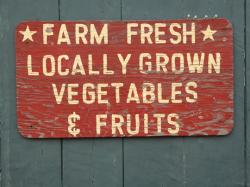New York Produce Show And Conference: Educational Micro-Session Reveals Restaurant Preferences And Willingness To Pay For Local Food
December 10, 2015 | 2 min to read

Local fruits and vegetables are extremely popular, with farmers typically selling directly to consumers. Yet many farmers have excess volume — not enough to sell to wholesalers but too much for the consumer market. Kenesha Reynolds-Allie, Ph.D., county agricultural and resource management agent, Rutgers University, Belvidere, NJ, studied the best ways to help farmers sell their surplus through local restaurants. She presented her research on how chefs consistently search for local products but face barriers in “restaurant preferences” and “willingness to pay for local food.”
“Consumers perceive local to be fresher and higher quality,” she explained. “They also want to support local producers and the local economy. This has led to increased demand for local in restaurants, and more chefs looking for local.” Reynolds-Allie pointed out that the sizable foodservice industry offers tremendous potential for farmers to tap into the market and network with restaurants.
Reynolds-Allie conducted her research on full-service independent restaurants in Alabama. She found potential benefits to farmers from selling to restaurants include higher returns and a guaranteed market over a contract period. However, farmers face potential challenges in cost, time, and travel requirements to deliver their products to restaurants. Restaurants benefit from greater access to products of fresher and higher quality, better ability to meet diner demands, and stronger support of the local economy and farmers. Restaurateurs perceive their challenges to include dealing with several producers rather than one supplier, erratic availability of local and seasonal items, reliability and consistency of delivery, and payment systems.
Differences exist between restaurants currently buying locally grown and those not doing so. Reynolds-Allie found purchasers of local have been in business longer and charge somewhat higher prices. Surprisingly, only about one-quarter of their food purchases were local products. Non-local purchasers were shown to be highly interested in local products, particularly vegetables, herbs, dairy, and meat. All restaurants expressed a preference to receive deliveries of local items from a foodservice supplier rather than to shop at a farmers market or order direct from farmers. Restaurants prefer natural over organic, whole over processed or bagged, and lower priced over higher. Fear of inadequate availability is a primary barrier.
Reynolds-Allie plans to continue her research with restaurants in New Jersey.
Source: PerishableNews.com
